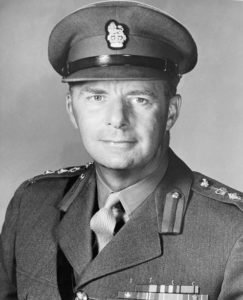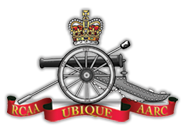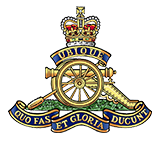Brigadier-General WW Turner, CD (1921-2016)

Brigadier-General William Wiglesworth Turner was born in Winnipeg on 17 September 1921. His father, the late Colonel M.W. Turner, OBE, CD was badly wounded on the Somme in the First World War and repatriated to Canada where he would go on to serve 35 years as an officer in the Canadian Army.
Brigadier-General Turner’s military service began with his enrollment as a gunner in 56th Heavy Battery, 5th (British Columbia) Coast Regiment, RCA of the Non-permanent Active Militia in Victoria in 1938 at age seventeen. In 1940, he entered the Royal Military College in Kingston, a member (College No. 2816) of the last class to enter the College before it closed in 1942 for the duration of the war. After commissioning, and additional artillery training in Petawawa, he proceeded overseas in July 1943 as a member of 23rd Field Regiment (Self-Propelled), RCA.
Lieutenant Turner landed in Normandy with his Regiment, part of the 4th Armoured Divisional Artillery, in the third week of July in 1944. Employed as a Gun Position Officer, he immediately went into battle as part of the Canadian main effort to capture Caen and close the gap at Falaise. Following the Battle of Normandy and the clearance of the Channel ports, he was promoted to Captain in December 1944 and transferred to 15th Field Regiment, RCA where he served as a Forward Observation Officer participating in the clearance of the German Army from the Scheldt Estuary and Hochwald Forest, and then the Rhine crossing before closing out the war in Germany near Wilhelmshaven. His wartime experience included close combat and manning observation posts usually within a few hundred yards of the objective and often under continual shelling and machine gun fire, while continuously directing accurate and effective fire on enemy positions.
After the fighting ceased in Europe, Captain Turner volunteered to join the Canadian Army Pacific Force intended for the invasion of Japan. He had returned to Canada and was in Toronto when the war in the Pacific ended with the bombing of Hiroshima and Nagasaki, and Japan’s subsequent unconditional surrender.
He remained in the Regular Army after the war joining 1st Field Regiment, RCHA from whence he was selected, in 1946, to attend the Long Gunnery Staff Course at the Royal School of Artillery in Larkhill. On attaining his IG qualification, he taught for three years at the Royal Canadian School of Artillery in Shilo including the task of training the first draft of recruits selected for service in Korea with the newly formed 2nd Field Regiment, RCHA. From 1951-53, he was the first Canadian Exchange IG at Larkhill. He attended the Canadian Army Staff College in 1954-55 followed by a posting to Western Command Headquarters in Edmonton. He commanded 4th Light Anti-Aircraft Battery, RCA in Victoria from 1956-57.
In 1957, he was appointed the Chief Operations Officer, United Nations Truce Supervisory Organization in Palestine stationed first in Gaza and then Jerusalem. While working with the Israel-Jordan Mixed Armistice Commission, he and Lieutenant-Colonel George Flint, PPCLI, came under fire on Mount Scopus. While attempting to evacuate wounded Israeli police officers during a ceasefire and while waving a white flag, Lieutenant-Colonel Flint was shot and killed. Major Turner was pinned down for several hours and only after darkness fell, was he able to make his way over to recover Lieutenant-Colonel Flint’s body.
From 1959-61, he served as Brigade Major of 4th Canadian Infantry Brigade Group (4 CIBG), then part of the British Army of the Rhine (BAOR) and stationed along the inner German border. The Cold War was at its height and 4 CIBG was an exceptionally strong formation considered by many the equivalent of a light division. Promoted to Lieutenant-Colonel in 1961, he took command of 3rd Regiment, RCHA in Hemer, Germany, and quickly turned a poorly performing regiment into one of the best, winning every single BAOR Divisional Artillery competition. He commanded for four years including leading the Regiment to its new home in Winnipeg in 1964.
In 1967, he was promoted Colonel and was posted as Commander of the Canadian Contingent and Deputy Chief of Staff of the United Nations Forces in Cyprus. After a stint as Director of Operations at NDHQ, he was selected, in 1969, to attend the Imperial Defence College Course in London. He returned to Canada, to Kingston, to join the Directing Staff at the National Defence College.
In 1973, he was promoted Brigadier-General and appointed Commandant of the Royal Military College, Kingston. There, on explicit orders from the then Chief of Defence Staff, General Jacques Dextraze, he worked tirelessly to put the ‘Military’ back into RMC. This he did with a single-minded determination to turn out first-class officers for the Canadian Forces. His term as Commandant and his mandatory retirement age were both extended, so that he could see the College through its Centennial Year celebrations in 1976.
Brigadier-General Turner ended his illustrious Regular Force career at the Royal Military College in 1977 where it had started 37 years earlier.
In 1979, he was appointed Colonel Commandant, The Royal Regiment of Canadian Artillery. His initial term was extended by a further three years. During his tenure as Colonel Commandant, General Turner visited every gun detachment in Canada and abroad at least once and made a point of speaking with as many young Gunners as he could. He worked diligently on issues of importance to The Royal Regiment and was one of its most respected advocates. He introduced the RCA Junior Officers Course for all newly commissioned officers as a way of imparting knowledge of The Regiment’s rich history and heritage and inculcating its time-honoured ethos and values.
Brigadier-General Turner’s time in uniform spanned 48 years. His leadership and mentorship during war, in the service of NATO and the UN, at home and abroad, in demanding appointments from Brigade Major to Commanding Officer, to Commandant of the Royal Military College, and finally, to Colonel Commandant of The Royal Regiment of Canadian Artillery, serve to inspire others. His soldierly virtues of courage, honour, dignified character, and devotion to his country and Regiment, have had an outstanding and lasting influence on several generations of Canadian and international officers and soldiers.
General Turner is the author of a book, “Memories of World War II – 1939 to 1945”, a personal account of his experiences in war, written for his family.
For his service he was awarded the following: 1939-1945 Star, France and Germany Star, Defence Medal, Canadian Volunteer Service Medal (with clasp), War Medal 1939-45, Special Service Medal, Canadian Peacekeeping Service Medal, UN Truce Supervisory Organization in Palestine Medal, UN Forces in Cyprus Medal, Canadian Centennial Medal, Queen Elizabeth II Silver Jubilee Medal, Queen Elizabeth II Diamond Jubilee Medal, Canadian Forces Decoration (with three clasps). The Government of France also honoured him by naming him a “Chevalier de la Légion d’honneur”.
After retirement from the Army, Brigadier-General Turner worked in the private sector as Vice President of the Urban Transit Development Corporation and, later, as a Development Manager with Homestead Land Holdings in Kingston, Ontario.
He was a lifetime member of The Royal Military College Club of Canada, was a Past President of its Kingston Branch and served as his Class Secretary for many years. He belonged to the Royal Canadian Artillery Association, the RCHA Brigade Association and Royal Canadian Legion Branch No. 560. He was an Honorary President of Royal Canadian Legion Branch No. 9 and was a Past President of the Royal Kingston United Services Institute.
After a rich and full life, Brigadier-General W.W. Turner passed away in Kingston, in December 2016 at the age of 95.


